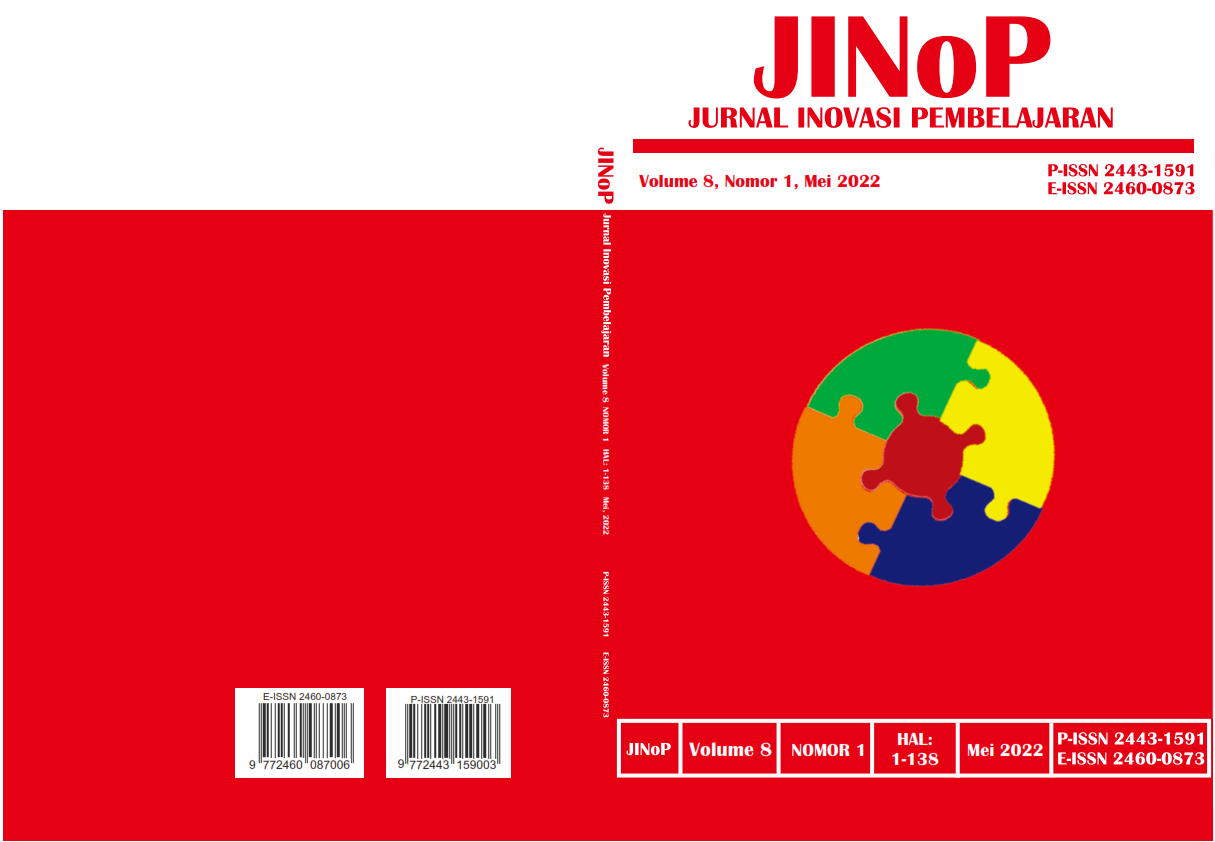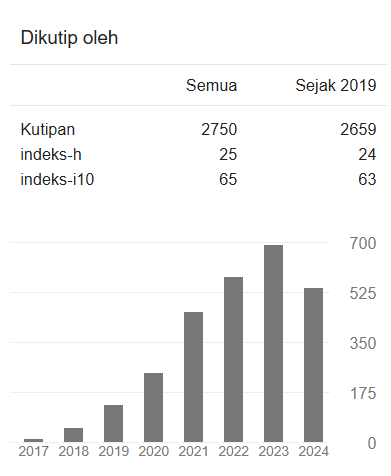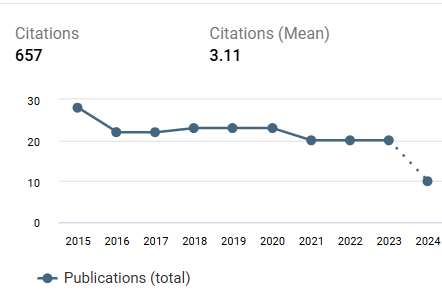Electric drive training kit sebagai produk inovasi media pembelajaran praktikum mahasiswa pendidikan vokasi: Analisis uji praktikalitas
DOI:
https://doi.org/10.22219/jinop.v8i1.19676Keywords:
Practicality Test, Electric drive training kit, Media Innovation, Vocational, Industrial Electrical EngineeringAbstract
This study discusses the practicality test analysis of an innovative product of practicum learning media, namely the Electric drive training kit which is used in electric drive practice lesson for vocational education students, Industrial Electrical Engineering study program. This development is carried out because of the unavailability of practicum learning media that are in accordance with the characteristics of the material and oriented to industrial developments which resulted in the learning process being not optimal. The purpose of the study is to reveal the practicality level of using the Electric drive training kit as a practicum learning media by users, namely lecturers and students. The practicality level is analyzed based on data from lecturers' assessments and student assessments after using the product in the learning process through filling out the practicality assessment sheet. The data are analyzed using percentage analysis and interpreted using a practical interpretation table. Practicality assessment sheets with a Likert scale are used as data collection instruments. The results show that based on the responses of lecturers and students, this media was very practical to use as a practicum learning media in the electric drive practice lesson. Thus, it can be concluded that the Electric drive training kit is very practical to use as a learning media to support the implementation of learning to be more optimal.
Downloads
References
Ahyanuardi, A., Candra, O., Yanto, D. T. P., & Bata, A. A. A. (2020). The Development of 1 Phase Induction Motor Training kits. International Journal of Scientific & Technology Research, 9(08), 541–545. http://www.ijstr.org/final-print/aug2020/The-Development-Of-1-Phase-Induction-Motor-Training-Kits.pdf
Arikunto, S. (2010). Research Procedure. Rineca Cipta.
Arsyad, A. (2018). Media Pembelajaran. Raja Grafindo.
Aswardi, R. M., Elfizon, N. (2019). Pengembangan Trainer Programable Logic Controlller Sebagai Media Pembelajaran di SMK Negeri Kota Payakumbuh. Jurnal Teknik Elektro Dan Vokasional, 1(1), 51–56. https://doi.org/10.24036/jtev.v5i1.104846.
Azwar, S. (2012). Reliabilitas dan Validitas (Edisi ke I; A. M. Haitami El jaid, ed.). Pustaka Belajar.
Biemans, H., Mulder, M., & Wesselink, R. (2004). Competence-based VET in the Netherlands : Journal of Vocational Education and Training, 56(4), 523–538. https://www.tandfonline.com/doi/pdf/10.1080/13636820400200268
Billett, S. (2002). Toward a workplace pedagogy: Guidance, participation, and engagement. Adult Education Quarterly, 53(1), 27–43. https://doi.org/10.1177/074171302237202
Billett, S. (2004). Workplace participatory practices: Conceptualising workplaces as learning environments. Journal of Workplace Learning, 16(6), 312–324. https://doi.org/10.1108/13665620410550295
Candra, O., Dewi, C., Yanto, D. T. P., & Hastuti, H. (2020). The Implementation of Power Electronics Training to Enhance Student Learning Activities in the Power Electronics Learning Process. International Journal of Innovation, Creativity and Change, 11(4), 362–373. Retrieved from https://www.ijicc.net/index.php/ijicc-editions/2020/155-vol-11-iss-4
Candra, O., Elfizon, E., Islami, S., & Yanto, D. T. P. (2020). Penerapan Multimedia Interaktif Power Point pada Mata Diklat Dasar dan Pengukuran Listrik. Ar-Raniry, 4(2), 87–95. https://jurnal.ar-raniry.ac.id/index.php/circuit/article/view/6660.
Chinguwa, S., Nyemba, W. R., Ngondo, E., & Mbohwa, C. (2019). Development of an electric drive train for cycles as a sustainable means of transportation for a green environment. Procedia Manufacturing, 33, 91–98. https://doi.org/10.1016/j.promfg.2019.04.013
Choi, S. J., Jeong, J. C., & Kim, S. N. (2019). Impact of vocational education and training on adult skills and employment: An applied multilevel analysis. International Journal of Educational Development, 66(March), 129–138. https://doi.org/10.1016/j.ijedudev.2018.09.007
Christidis, M. (2019). Vocational knowing in subject integrated teaching: A case study in a Swedish upper secondary health and social care program. Learning, Culture and Social Interaction, 21(January), 21–33. https://doi.org/10.1016/j.lcsi.2019.01.002
Chu, S. K. W., Zhang, Y., Chen, K., Chan, C. K., Lee, C. W. Y., Zou, E., & Lau, W. (2017). The effectiveness of wikis for project-based learning in different disciplines in higher education. Internet and Higher Education, 33, 49–60. https://doi.org/10.1016/j.iheduc.2017.01.005
Dewi, C., Yanto, D. T. P., & Hastuti, H. (2020). The Development of Power Electronics Training kits for Electrical Engineering Students : A Validity Test Analysis. Jurnal Teknologi Pendidikan Kejuruan, 3(2). https://doi.org/10.24036/jptk.v3i2.9423.
Eliza, F., Suriyadi, S., & Yanto, D. T. P. (2019). Peningkatan Kompetensi Psikomotor Siswa Melalui Model Pembelajaran Project Based Learning ( PjBL ) di SMKN 5 Padang : PDS Project. INVOTEK: Jurnal Inovasi Vokasional dan Teknologi, 19(2). https://doi.org/10.24036/invotek.v19i2.427.
Fahmi, R. (2020). Pengembangan E-Modul Berbasis Web Pada Mata Pelajaran Pembuatan Busana Industri. Jurnal Pedagogi Dan Pembelajaran, 3(3), 508–515. https://doi.org/10.23887/jp2.v3i3.29123.
Hastuti, H., Anugrah, P., Yanto, D. T. P., & Astrid, E. (2020). Design and Development of Electric Drive Training kit for Speed Control of Three-Phase Induction Motor. Journal of Xidian University, 14(12), 385–392. https://doi.org/10.37896/jxu14.12/040
Hikmah, N., Saridewi, N., & Agung, S. (2017). Penerapan Laboratorium Virtual untuk Meningkatkan Pemahaman Konsep Siswa. EduChemia (Jurnal Kimia Dan Pendidikan), 2(2), 186. https://doi.org/10.30870/educhemia.v2i2.1608
Jalinus, N., & Ambiyar. (2016). Media & Sumber Pembelajaran. Kencana.
Jannah, R. (2017). Pengembangan Media Pembelajaran Fisika Berbasis dengan Menggunakan Adobe Flash Cs 6 Siswa Kelas XI MAN 2 Padang. Natural Science Journal, 3(2), 429–437. https://ejournal.uinib.ac.id/jurnal/index.php/naturalscience/article/view/437/357.
Kaitwanidvilai, S., & Khan-ngern, W. (2000). PWM-CAD1: An Interactive and Efficient PWM Inverter Training kit. IEEE Power engineering Power Society Winter Meeting. https://doi.org/10.1109/PESW.2000.850168
Khairudin, A. R. M., Abu-Samah, A., Aziz, N. A. S., Azlan, M. A. F. M., Karim, M. H. A., & Zian, N. M. (2019). Design of portabel industrial automation education training kit compatible for IR 4.0. Proceeding - 2019 IEEE 7th Conference on Systems, Process and Control, ICSPC 2019, (December), 38–42. https://doi.org/10.1109/ICSPC47137.2019.9068090
Korber, M., & Oesch, D. (2019). Vocational versus general education: Employment and earnings over the life course in Switzerland. Advances in Life Course Research, 40, 1–13. https://doi.org/10.1016/j.alcr.2019.03.003
Kouzou, A., Saifullah, P., Iqbal, A., & Abu-Rub, H. (2013). Performance analysis of a five phase induction motor under unbalanced voltage supply. 2013 10th International Multi-Conference on Systems, Signals and Devices, SSD 2013, 1–8. https://doi.org/10.1109/SSD.2013.6564086
Manoharan, G., Thomas, F., Joseph, E. K., Jayadevan, M., Amaljith, K., & Raghu, C. V. (2018). Design and Implementation of Micro-Controller Training kit with GUI Support. INDICON 2018 - 15th IEEE India Council International Conference. https://doi.org/10.1109/INDICON45594.2018.8987006
Manuel, P. M., Pilar, A. M., María Dolores, R. M., MP, D., Sara, P., & M. Pilar, M. J. (2019). Characterization of biodiesel using virtual laboratories integrating social networks and web app following a ubiquitous- and blended-learning. Journal of Cleaner Production, 215, 399–409. https://doi.org/10.1016/j.jclepro.2019.01.098
Mikkonen, S., Pylväs, L., Rintala, H., Nokelainen, P., & Postareff, L. (2017). Guiding workplace learning in vocational education and training: A literature review. Empirical Research in Vocational Education and Training. https://doi.org/10.1186/s40461-017-0053-4
Mulder, M., Weigel, T., & Collins, K. (2007). The concept of competence in the development of vocational education and training in selected EU member states: A critical analysis. Journal of Vocational Education and Training, 59(1), 67–88. https://doi.org/10.1080/13636820601145630
Pérez, D., Balcells, J., Lamich, M., Berbel, N., Zaragoza, J., & Mon, J. (2008). Training kit for power electronics teaching. IECON Proceedings (Industrial Electronics Conference), 3541–3545. https://doi.org/10.1109/IECON.2008.4758532
Riduwan. (2010). Skala Pengukuran Variabel-Variabel Penelitian. Alfabeta.
Sugiyono. (2018). Quantitative, Qualitative, and R& D Research Methods. Alfabeta.
Sukardi, S., Puyada, D., Wulansari, R. E., & Yanto, D. T. P. (2017). The Validity of interactive Instructional Media on Electrical Circuits at Vocational High School and Technology. The 2nd INCOTEPD, 2017, 21–22. https://eprints.uny.ac.id/58200/.
Xing, B., & Marwala, T. (2017). Implications of the Fourth Industrial Age on Higher Education. https://doi.org/arXiv preprint arXiv:1703.09643.
Yanto, D. T. P. (2019). Praktikalitas Media Pembelajaran Interaktif pada Proses Pembelajaran Rangkaian Listrik. INVOTEK: Jurnal Inovasi Vokasional Dan Teknologi, 19(1), 75–82. https://doi.org/10.24036/invotek.v19i1.409
Yanto, D. T. P., Astrid, E., Hidayat, R., & Islami, S. (2019). Feasibility Test Analysis of the Power Electronics Trainer Kit : 3 Phase Half-Wave and Full-Wave Uncontrolled Rectifier. Jurnal Teknik Elektro Dan Vokasional, 5(1.1), 121–125. http://ejournal.unp.ac.id/index.php/jtev/article/view/106215.
Yanto, D. T. P., Sukardi, S., & Puyada, D. (2017). Effectiveness of Interactive Instructional Media on Electrical Circuits Course : The Effects on Students Cognitive Abilities. Proceedings of 4rd International Conference On Technical And Vocational Education And Training, 2017, 75–80.
Downloads
Published
How to Cite
Issue
Section
License
Copyright (c) 2022 Yanto et al

This work is licensed under a Creative Commons Attribution 4.0 International License.
Copyright Notice
Authors who publish with JINoP (Jurnal Inoasi Pembelajaran) agree to the following terms:
- For all articles published in the JINoP (Jurnal Inovasi Pembelajaran), copyright is retained by the authors. Authors give permission to the publisher to announce the work with conditions. When the manuscript is accepted for publication, the authors agree to the automatic transfer of the publishing right to the publisher.
- Authors retain copyright and grant the journal the right of first publication with the work simultaneously licensed under a Creative Commons Attribution 4.0 International License. that allows others to share the work with an acknowledgment of the work's authorship and initial publication in this journal.
- Authors are able to enter into separate, additional contractual arrangements for the non-exclusive distribution of the journal's published version of the work (e.g., post it to an institutional repository or publish it in a book), with an acknowledgment of its initial publication in this journal.
- Authors are permitted and encouraged to post their work online (e.g., in institutional repositories or on their website) prior to and during the submission process, as it can lead to productive exchanges, as well as earlier and greater citation of published work (See The Effect of Open Access).








